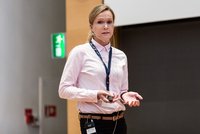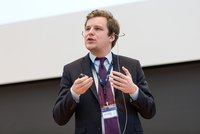- Education
-
Research
Current research
Talent
-
Collaboration
Businesses
Government agencies and institutions
Alumni
-
About AU
Organisation
Job at AU
Three PhD students took the stage at the start of the traditional PhD Day at Health when the doors opened Friday. They were the recipients of the Fogh-Nielsen scholarship of DKK 125,000. Their presentations on the stage determined how the scholarship was distributed.
2016.01.26 |

The Lakeside Lecture Theatres will be full when the three recipients of the Fogh-Nielsen scholarship present their projects friday at PhD Day 2016. Photo: Maria Randima Brauer Sørensen

Stinne Greisen. Photo: Maria Randima Brauer Sørensen

Kaja Zuwala. Photo: Maria Randima Brauer Sørensen

Lars Andersen. Photo: Maria Randima Brauer Sørensen
This Friday the Lakeside Lecture Theatres was again full of PhD students, supervisors and other people with an interest in research, when the annual PhD Day at Health took place. Some of the first people in action on the day was the three research talents Lars Wiuff Andersen, Kaja Weronika Zuwala and Stinne Greisen. They were the recipients of the Fogh-Nielsen scholarship, which this year totals DKK 125,000 kroner, and presented their projects - covering research into bypass operations, chronic arthritis and the HIV virus. The presentation of their PhD project determined how much of the scholarship each received, but they would have to wait until the evening celebration following the PhD Day to find out.
Stinne Greisen recieved the largest portion of the grant - DKK 60,000, while Kaja Zuwala recieved DKK 40,000 and Lars Andersen received DKK 25,000.
The Fogh-Nielsen scholarship is awarded to PhD students on the final part of their course and is given “to help continue excellent research efforts”, as the call for applications states.
Stinne Greisen, PhD student at the Department of Biomedicine:
Stinne Greisen carries out research into the role of the immune system in rheumatoid arthritis. Rheumatoid arthritis is an autoimmune disease in which, for reasons that are still unknown, the immune system spreads inflammation in the body's joints. Stinne Greisen examines a receptor called PD1 which hampers the immune system’s normal activity. In patients with rheumatoid arthritis, the level of soluble PD1 in the blood is high when the disease is very active. In her project, Stinne Greisen has investigated whether exoms, which are small particles that are used by the immune system to communicate, spread PD1 to other cells. She has shown that exoms are found in the blood and joint fluids of patients with rheumatoid arthritis, and that they contain PD1. She has also shown that PD1 can be transferred from exoms to other cells in the environment around inflamed joints. This provides a new understanding of how the inflammation in arthritis develops, and a new perspective in the future treatment of diseases with chronic inflammation.
Kaja Zuwala, PhD student at the Department of Clinical Medicine:
Thirty-seven million people globally are living with HIV virus, which is one of the leading causes of death in the world. Present methods of treatment can suppress HIV virus and stop the progression of the disease, but cannot cure patients. The virus persists in the patients’ cells in a state of latency and hides from our immune system. Therefore, HIV patients have to take their drugs lifelong. Kaja Zuwala examines a new drug called panobinostat. Panobinostat wakes HIV from its state of latency and reveals the virus to the immune system, which can kill the infected cells. Unfortunately, panobinostat, which is approved for the treatment of cancer, has side effects. Kaja Zuwala’s research aims to reduce the side effects of panobinostat and to target the HIV-infected cells only.
Lars Andersen, PhD student at the Department of Clinical Medicine:
Around 2,800 heart by-pass operations are carried out annually in Denmark. Following the operation, many patients suffer serious complications such as infections, irregular heart rhythm and blood clots in the heart or brain. The complications lead to longer term admission to the intensive care unit and hospital. Lars Andersen's study shows that many patients have high lactic acid levels after their operation, and that these patients have an higher risk of developing complications. The research also shows that more patients have low vitamin B1 levels after the operation, and that these patients also often have high lactic acid levels. In the study, Lars Andersen tests whether supplementing with vitamin B1 before the operation can reduce lactic acid levels after the operation and thus reduce the risk of complications.
· Read the programme for the PhD Day 2016.
· Read about the theme for the PhD Day 2016.
PhD student Stinne Greisen
Aarhus University, Department of Biomedicine
srg@biomed.au.dk
PhD student Kaja Weronika Zuwala
Aarhus University, Department of Clinical Medicine
kzuwala@clin.au.dk
PhD student Lars Wiuff Andersen
Aarhus University, Department of Clinical Medicine
lwandersen@clin.au.dk
Updated January 25th.